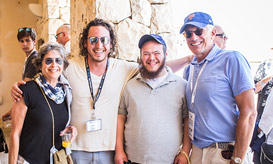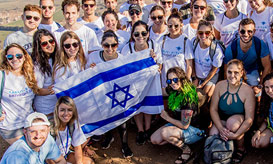Growing up in Massachusetts, my family went to temple every so often. I started going less and…
A parent whose children will join an upcoming Taglit-Birthright Israel trip asked Zohar Raviv, the program’s international vice president for educational strategy, “What are my kids going to get out of this trip?”
“I don’t know what your kids are going to get,” Raviv replied. “I know what I intend for them to get.”
The criteria for success, he said during a visit to Atlanta, is not a young adult returning home having “figured out” their relationship to Judaism and to Israel, but rather coming home and saying, “I finally understand how hard it is to understand.”
Since the first plane carrying college students touched down in late December 1999, 800,000 young Jewish adults, from 68 countries, have participated in Birthright trips. Approximately 600,000 have come from the United States, among them 9,500 from the Atlanta area.
“The endgame of Birthright, the way I put it, is to transform Jews by birth into Jews by worth,” Raviv said. “I want them to return with a sense of ownership over their own Jewish identity, their own Jewish vitality, their own passion toward Israel and its glorious imperfections.
“Israel was established as the homeland of the Jewish people, and not as the homeland of the Jewish people who live in Israel. Israel is your and your children’s homeland, irrespective of the land which is their home,” he continued, “the two ideas don’t contradict or live in tension with one another.”
In a Brandeis University survey of participants in summer 2021 trips, 69 percent felt it one of the best experiences of their lives, 44 percent extended their stay in Israel beyond the scheduled 10 days and the percentage who felt “very much” connected to Israel increased from 35 percent prior to the trip to 56 percent afterward.
Birthright’s challenge was reflected in an American Jewish Committee survey of millennials — defined as 25 to 40 years old — conducted in February and March 2022, in which 43.8 percent said that being connected to Israel was either “not too important” or “not at all important” to their Jewish identity.
Likewise, a Pew Research Center survey conducted between November 2019 and June 2020 found that among respondents ages 18-29: 33 percent said that being Jewish was not too important or not important at all to them, 44 percent said that they had not much or nothing at all in common with Jews in Israel and 51 percent said the they had little or no emotional attachment to Israel.
The program has grown to meet the interests of participants, such as the LGBTQ+ community, outdoor enthusiasts and people with various degrees of religiosity and spirituality, foodies and those in recovery from alcohol addiction. The seven- or 10-day trips, in summer and winter, are filled with visits to sites of historic and religious importance and engagement with modern Israeli culture.
“Israel was established as a state of ideals, and not an ideal state,” Raviv said. “We try to present to our participants an Israel that is delightfully imperfect.”
Participants have included 100,000 young Israelis, many serving in the Israel Defense Forces.
“Birthright Israel affects the Israeli public and especially young Israeli Jews positively, to no less effect than it affects American young Jews who come to Israel,” Raviv said. “The impact of this program on this young generation of Israelis, who finally understand American Jewry, not only through the lens of philanthropy or political lobbying, but as actual human beings, as an actual vibrant community that lives outside of Israel, is profound.”
The current eligibility range of ages (18 to 31) next year reverts to the pre-COVID range of 18 to 26. While the trip is free to participants, Raviv estimates that Birthright — with annual operating costs of $180 million to $200 million — spends about $4,500 per person, an expense he said has increased by $1,500 since pre-COVID times, taking into account inflation and increased operating costs.
Birthright is funded by donors from the Jewish community, the Israeli government, the Jewish Federations of North America and the Jewish Agency for Israel.
Raviv said that Birthright adjusts itineraries to avoid placing participants in harm’s way. He spoke to the AJT a couple of days into a ceasefire between Israel and the Islamic Jihad. Israel conducted preemptive air strikes against Islamic Jihad targets in Gaza. The militants fired more than 1,000 rockets toward Israel.
Every Birthright group attends a lecture by an adjudged expert on “the complex geopolitical reality of Israel and the Middle East,” Raviv explained. That lecture is important because “Israel is the homeland of the Jewish people, but it is not a state where only Jews live.” Three-quarters of Israeli citizens are Jewish. The remainder are Arab Muslims and Christians, Bedouins, Druze and other communities.
Birthright has teamed with the Inter-Agency Task Force on Israeli Arab Issues, which focuses on awareness of Israeli Arabs among Jewish Americans, to increase the visibility on the trips.
That segment of Israel’s population is distinct from the Arab populations of the West Bank and Gaza. Instances of participants dropping out during a trip, to protest what they felt was inadequate attention to the Israel-Palestinian conflict, have drawn attention from both the secular and Jewish press.
“Birthright Israel always welcomes participants’ views and questions, which are essential to the success of the experience, so long as they are shared in a constructive and respectful manner. We will not condone any coordinated plans to ruin the experience for others in order to promote a specific agenda,” the organization said following an incident in 2018.













